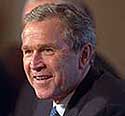|
 The Indian government appears to be so devoid of talent and political acumen that even the act of one minister being vocal at the Cancun ministerial meet qualifies him to be ranked a hero back home. The Indian government appears to be so devoid of talent and political acumen that even the act of one minister being vocal at the Cancun ministerial meet qualifies him to be ranked a hero back home.
Union Commerce Minister Arun Jaitley is, no doubt, one of the intelligent, hardworking and competent ministers in the Union Cabinet. He does not come out on television or in public appearances as some of the other less competent, highly egotistic and arrogant members of the Cabinet. If Jaitley had worked to build up unity of action the 80 developing nations that put up a fight for their due rights and privileges at Cancun, one could have given him full marks. The skilful and experienced lawyer that he is, he merely presented India's and their case before the Cancun conference. If we look back at the glorious days of the formation of our foreign policy, particularly during the heydays of non-alignment and peaceful coexistence, we will be awestruck by the amount of spadework that some of the pioneers of these movements had to undertake to bring around as many nations outside the spheres of influence of the two superpowers to form a group of their own. At Cancun almost all the 80 nations saw through the wiles of the rich nations and their strategies to create markets for themselves in the poor countries. Sheer economic compulsions appear to have brought them together than any kind of organisational effort on the part of India or any other leader of the developing countries.  Would any other minister in the Union Cabinet have been able to make his presence felt at Cancun so effectively as Jaitley? Perhaps not. And for that, the commerce minister deserves credit. Would any other minister in the Union Cabinet have been able to make his presence felt at Cancun so effectively as Jaitley? Perhaps not. And for that, the commerce minister deserves credit.
Are we taking any follow-up action to bring all the 80 aggrieved nations together on the same platform for concerted action? That is the most vial aspect that the government needs to apply its mind to, as a follow up to the Cancun conference. Many of the poor countries still do see India as their natural leader to voice their grievances and their demands at international forums. We have not risen up to their expectations. We do not have a Vijayalakshmi Pandit or a V K Krishna Menon or an Arthur Lal or a G Parthasarathy at the UN today. One can only hope that Prime Minister A B Vajpayee, who made a remarkable presentation at the UN in 1977 as the then minister for external affairs, will offer a repeat performance when he addresses the UN General Assembly in the fourth week of this month. It is a lamentable fact that no Indian delegate has made any mark in the Assembly for the last two decades. Maybe there have not been any foreign ministers of calibre or Indian ambassadors to the UN worth mentioning in this period. What is true of India is perhaps equally true of other nations as well. And that is why there has been a decline in the efficiency of that organisation, as Vajpayee stated while embarking on his 18-day tour of Turkey and the US. Vajpayee himself is aware of the grave problems that face India and the region around us. If the role and structure of the UN itself had been called into question of late, we also have to share the blame for it. Unless men (or women) of substance raise their voices in the UN and checkmate the manoeuvres of the US and other big powers, the UN is bound to lose its utility and justification. UN Secretary General Kofi Annan, who owes much to the US for his second term in office and was seen openly acknowledging it when he went to pay obeisance to the president of the US, has now been left fighting his battles all alone. Could India's voice in support have made the kind of difference we expect? India could have emerged as the rallying point for several other countries of Asia and Africa. Instead, we are seen as a country only too willing to appease the US and curry favour with it. There is suspicion that Vajpayee has undertaken the current visit to the US largely to ensure that the American president pays his promised visit to this country before the end of the year. Indian Foreign Minister Yashwant Sinha, no adornment to that office, has made it clear that if the UN gives the call for an international peacekeeping force, India would willingly join it. The UN, located as it is in the US, is vulnerable. As it is the US has been exerting pressure on the UN through devious ways to bend it as an instrument of American foreign policy. There have been a number of retired military generals, senior bureaucrats, including former cabinet secretaries, who have been clamouring for Indian troops to be sent to Iraq, without a thought being given to whether the Iraqi people want us there or not. In the absence of any specific request from Iraqi organisations, we will be seen only as the cat's paw of the occupation forces of the US. Men who do not know the political implications of any wrong Indian step are clamouring the loudest that we send our troops there.  This issue will figure in the talks Vajpayee will hold with George W Bush in New York. Bush is under pressure from home for the frequent attacks on US soldiers and establish-ments in Iraq that are becoming worse by the day. Indian troops, he hopes, would provide some relief to the besieged American troops. It would thus hardly be in our national interest. Vajpayee, as an astute politician, would have the capacity to realise this; not a former bureaucrat pitchforked into an august office. This issue will figure in the talks Vajpayee will hold with George W Bush in New York. Bush is under pressure from home for the frequent attacks on US soldiers and establish-ments in Iraq that are becoming worse by the day. Indian troops, he hopes, would provide some relief to the besieged American troops. It would thus hardly be in our national interest. Vajpayee, as an astute politician, would have the capacity to realise this; not a former bureaucrat pitchforked into an august office.
The 80 nations that thwarted the plans of the US to enforce its economic domination over the rest of the world are looking for a leader-nation that can guide them against the wiles of the neo-imperialist nations. The celebration among them on the failure of the Cancun conference indicates just that. China is not - and cannot claim - leadership nor can Brazil, the other major country that held the fort against America. All of them were against the questionable farm subsidies provided by the US to boost exports of its farm products to the detriment of exports from developing countries. Trade in the globalised world is two-way traffic. If the US needs the Chinese market for its goods, China needs the huge American market to unload all the highly competitive products that country manufactures - from the Stars and Stripes to cowboy shirts and jeans - at a fraction of the cost at which the US can make them. There are a number of ways in which the US can wean away many of the developing countries - one by one or in smaller groups. They need a rallying force to keep them together and which can help them overcome some of the economic pressures brought on them. If India were to take up this task, it clearly needs an external affairs minister who has charisma, skill, political acumen and the ability to win the trust and confidence of impoverished nations of the world. (The writer is a senior journalist based in Mumbai)
|